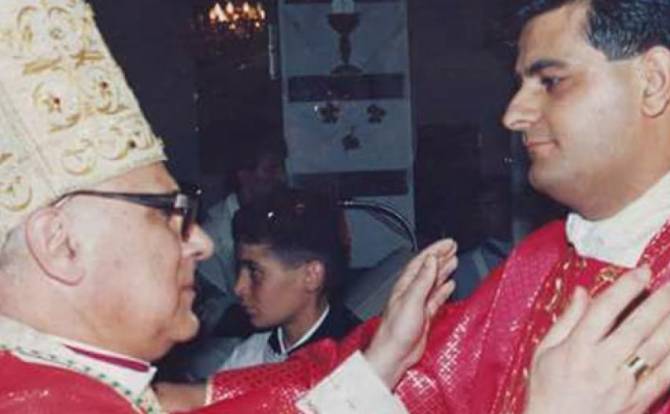These days I recall the 25th anniversary of my priestly ordination which is usually referred to as the “priestly silver jubilee”. I have had the honor to work in the Latin Patriarchate of Jerusalem since 1995 (which included Jordan, Palestine and Cyprus) during the era of Patriarch Michel Sabbah, the first Arab patriarch of the Holy City, Jerusalem. I can talk about two aspects, namely the priestly work and the media work.
The first aspect deals with being a clergyman at the end of the 20th century and the first two decades of the 21st century. The issue at this point is not to address the ease or the difficulty of priestly work, or even the work of a cleric in general.
There are of course challenges imposed over time, the most important of which is that the clerics, decades ago, were different from those nowadays. For instance, since my childhood in Wahadneh township, northern Jordan, we used to view the priests as the prime teachers, and that they were the guide, the basic reference, and that without them nothing was perfect either in the Church or in the village, which was at the time bereft of electricity, water and livelihood.
The situation has changed nowadays and the clerics are viewed as ordinary people. The aura of “superman” has dissipated and they have to perform their spiritual and religious duties in addition to administrative work. This is, of course, due to the development of institutions affiliated with the Churches in Jordan and Palestine, as some of them are academic, charitable, as well as spiritual.
The daily work of Christian clerics in the Arab region is characterized by being a man of peace, love, unity and brotherhood, as well as being open to other Churches. They also have to respect the followers of other religions, and to teach the younger generations the importance of accepting others, no matter how different they are or because they are different.
Our churches and our clergymen are of course characterized by having their education free from intolerance and exclusion, as well for never being biased. It always included projects of openness, dialogue, affection, and brotherhood, especially in their spiritual work, namely in the field of education as well as in religious education in the schools affiliated with the Church in Jordan. Praise be to God, these schools have been playing an honorable, distinguished and pioneering role.
The priests in our country are addressed as “our father”, and this word means a lot, as they are trained year after year to be as fathers for everyone. And when people address priests as “our father”, they at first have the feeling of pride, but as the years go by, they feel that this address is a responsibility as well. The priests feel proud when seeing their parishioners grow in number, so they are really feel proud while viewing this in practice.
The second part of my work in the last quarter of the past century involved media, since before my priestly ordination I used to write articles to some newspapers, including those in Palestine, by virtue of my studies.
This matter led to the establishment of a website in 2003 named “abouna website” at a time when several distinguished websites emerged in Jordan. Among its bright impressions is that it posts religious news, news of interfaith dialogue, the bright Christian Arab presence, and religious tourism, as well as articles that are posted in newspapers or written by specialists. This site attracts readers, not only Jordanians, but also Arabs and foreigners from all over the world.
The second issue implies the establishment of the Catholic Center for Studies and Media (CCSM) eight years ago. Thank God this center has a prestigious presence in our beloved homeland in cooperation with media and dialogue sites in the world. The religious media, in particular, has its challenges but in our modern era they have become a necessity, given that many sites can post excerpted or fake news. In this case, it is incumbent upon the true and healthy religious media to be a defender of the truth.
The CCSM has had the honor to organize a number of conferences in Jordan which revealed a distinct international presence, most notably is the conference on the role of the Christian media in serving justice, peace and human rights issues, as well as “Media and Their Role in Defending the Truth”. The CCSM also held several training workshops for university students so that media would serve what we call “the culture of encounter.” I am also honored to note that this year also marks the 25th anniversary of my first article in Al-Rai daily, which is part of my work in the field of media over the past period.
I thank God for everything, for the years of service, and for how God of love availed people who supply the candle of my priesthood with the oil of their care, loyalty and friendship. There are, of course, those who tried to put out this candle by not considering its light useful, may God forgive them! But, thank God, the first category is much larger than the second one.
May the Almighty God help us all attain goodness.
By: Fr. Dr. Rif’at Bader
Source: en.abouna.org






